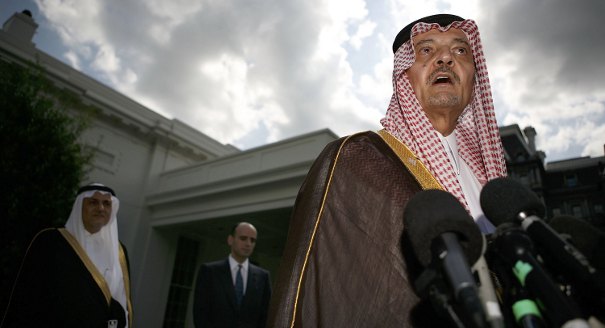Under the norms prevalent in Saudi Arabia since the beginning of the Saud family’s rule, princes of varying age and political responsibility have been expected to show their allegiance to Islam, specifically the Salafi interpretation, in all events public and private, even sporting events. This continuously announced loyalty on the part of the ruling family is in turn rewarded by unwavering religious support from the ulema (clerics), who are constantly adapting religious interpretations to suit the interests of the public and the ruling family. The Saudi version of religion has proven to be an effective weapon for the monarchy to rely upon in facing political and security crises, and the rulers have become highly adept at using religion and state clerics to expand their own influence. However recently, Salafi clerics have begun to fear a change to this long held agreement.
While a group of prominent Salafi figures were preparing to meet King Abdullah on April 9 at his spring retreat in the oasis of Rawdhat Khuraim, northeast of Riyadh, to voice their objections to what they saw as the corruption “of society and women, news spread that Prince Mutaib bin Abdullah’s demand that “religion not enter into politics” in an April 7 speech celebrating the annual Jenadriyah Festival. Some Salafis saw this as a message from the royal family that it is leaning towards separation of religion and the state—particularly coming from a prince with so many roles (besides being the king’s son, Prince Mutaib is a minister of state and the head of the National Guard). However, there has been precedent for such a statement: Prince Turki Al-Faisal, former head of the intelligence services, first hinted that Saudi Arabia could go down a path of separate political and religious sphere in an op-ed for the pan-Arab daily Asharq Al-Awsat back in 2002. Prince Turki then defined the concept of “those in authority” (wali al-amr) in the Quranic verse “O you who have believed, obey God and obey the Messenger and those in authority among you” (4:59) as meaning the rulers alone. This contradicted the interpretation of prominent figures in the religious establishment like Abdullah Al-Turki, who had argued that wali al-amr referred to both the rulers and the ulema.
Several religious figures expressed their dissatisfaction with Prince Mutaib’s statement, with Sheikh Abdul-Aziz Al-Tarifi being the most vocal in his criticism, noting on Twitter that: “Whoever says there is no relationship between religion and politics worships two gods, one in the heavens and one on earth.” Even though the relationship between religion and politics in Saudi Arabia actually differs little from the thrust of Mutaib’s statement, the fact that he would openly say so is unusual; Salafis see this as a violation of the unspoken rules of their oath of fealty.
Other incidents at Jenadriyah Festival worsened the already contentious mood. A member of Committee for the Promotion of Virtue and the Prevention of Vice (CPVPV) stormed a performance by an Emirati musical ensemble and female singer and had to be forcibly removed by a group of Saudi National Guard soldiers. Another confrontation between members of the CPVPV and national guardsmen providing security took place during the event. The CPVPV was acting on the orders of the official religious establishment which forbids mixing between men and women as well as singing, “especially if it is a woman’s voice,” as stated by the Senior Ulema Council. Meanwhile, the annual Jenadriyah heritage and folklore festival in Riyadh is organized by the National Guard, led (currently) by Prince Mutaib, and takes place in Riyadh—at the seat of the monarchy.
King Abdullah’s attitude might also be increasing the religious establishment’s nervousness. The king has historically had close political, military, and strategic ties with the United States and the West in general, and has been open-minded towards other religions, as seen in the funding of an interfaith dialogue center in Vienna whose November 2012 inauguration was attended by Catholic priests, Jewish rabbis, and leaders from the Saudi religious establishment. The king encourages investments in higher education and cultural exchange, gives thousands of Saudi students, male and female, scholarships to study in Europe and the US, and within Saudi Arabia. Not only did the king spent over $30 billion on the groundbreaking King Abdullah University of Science and Technology (KAUST), but also asked Sheikh al-Satri in October 2009 to resign from his position in the Senior Ulema Council for his objections to KAUST being co-ed and allowing concerts on campus.
Prince Mutaib’s statement shows that Saudi decision-makers have begun to lose their patience with the pervasive influence of Salafi individuals and institutions within Saudi public affairs, and see that historical relationship between religion and politics as burdening Saudi rulers, who must find a new formula for their relationship. The rulers seem to see it in their interest to limit the powers of their religious partner and weaken its direct influence on society through education, media, and the economy. Regardless of the significance of the events at the Jenadriyah Festival, what is certain is that the incidents reflect a larger dilemma: that of the Saudi state’s identity, torn between the different visions espoused by the princes and the sheikhs. Is it a religious state subject to Salafi interpretations of sacred texts still maintaining the 1744 pact between Mohammed bin Abdul-Wahhab and Mohammed bin Saud? Or is it a kingdom with a unique political system amalgamating a variety of autocratic, traditional, and religious aspects and also balancing secularism, realpolitik, and capitalism?
Ibrahim Hatlani is a Jeddah-based Saudi writer and researcher.



.jpg)


